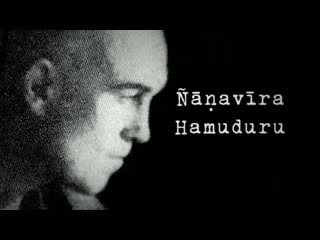
This is a short documentary about the influential English monk, Ven. Ñāṇavīra, previously Harold Edward Musson, who along with Osbert Moore (who became Ven. Ñāṇamoli), left England for Sri Lanka in 1949. It only really touches the surface, and doesn’t go into his philosophy too much, concentrating on his life story, but it might be enough to inspire those who are interested to look a bit deeper into his teachings.
After ordaining Ñāṇavīra Thera inclined to a solitary life and after a few years at the Island Hermitage he went to a remote section of southeast Ceylon, where he lived alone for the rest of his life in a one-room, brick-and-plaster kuti (hut) with a tile roof, not far from the village of Bundala, on the edge of a large bird sanctuary.
Not long after arriving in Ceylon, he contracted a severe case of amoebiasis which continued to plague him for the next fifteen years. The tropical climate and the local food must have been taxing for the physically ailing Westerner. Bhikkhus only accept food which is offered to them by laypeople, and this custom often leaves them with few options concerning their diet.
He died on 5 July 1965, by his own hand and deliberate decision. Ña?avira Thera wrote extensively and carefully on the question of suicide, which arose in him because of the severity of the amoebiasis and satyriasis.
(drawn mainly from the Wikipedia page on Ven. Ñāṇavīra)
The main interview is with Ven. Nyanaramita, who himself arrived at Island Hermitage in 1964, and met with Ven. Ñāṇavīra on a number of occasions, and there are also interviews with Bogoda Premaratne, Asanga Tilakarathne and some of the supporters of the hermitage in Bundala where Ven. Ñāṇavīra spent his final years.
if the video does not appear on the page, try reloading the page; and if that doesn’t work, leave a comment so I can update the page (the comment is not published)

Fascinating life story.
“Don’t think about good and bad. Don’t consider right and wrong,” Dogen advized in his instructions for sitting-meditation.
In similar vein, FM Alexander cautioned his student teachers “You all fix.”
I certainly do, tend to fix, tend to worry about good and bad.
Is suicide good or bad? I don’t know. But I know fixing, when I see it — especially in others!
I know what trying to be right is — mistake no. 1 for strivers everywhere.
Those Sri Lankan elders who took the picture down are not so venerable in my eyes — it seems to me that they wanted to be on the right side of the argument, which is not the same as being in the middle.
Well, watching the video stimulated me thus to express a view and opinion — not the same as dropping off all views and opinions, as recommended by the Buddha.
So am I just criticizing in those others a tendency, or a fault, that I don’t wish to see in myself? Inevitably. For some reason, the idea that “I” can be “right” persists.
As FM Alexander noted, “The most difficult things to get rid of are the ones that don’t exist.”